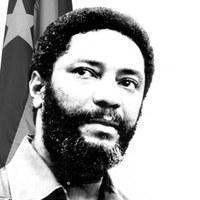Aruba (Netherlands Antilles), 1944 – St. George (Grenada), 1983
By Carlos Eduardo Martins
 Maurice Bishop, son of Rupert and Alimenta Bishop, was the main leader of Grenada’s socialist experiment and was ultimately executed during the far-left coup led by Bernard Coard, which provided the pretext for the U.S. invasion of Grenada.
Maurice Bishop, son of Rupert and Alimenta Bishop, was the main leader of Grenada’s socialist experiment and was ultimately executed during the far-left coup led by Bernard Coard, which provided the pretext for the U.S. invasion of Grenada.
Bishop began his political journey in the student movement, founding, along with Coard—his fellow student at Grenada Boy’s Secondary School—the Grenada Youth Assembly for Truth. In 1963, he entered London University’s law program, graduating in 1966. He then became president of the West Indian Students’ Society, an activist in the Campaign Against Racial Discrimination (CCDR), and co-founded a legal aid office serving West Indian communities in Notting Hill.
Returning to Grenada in 1970 after a short period in Trinidad and Tobago, Bishop became active in the popular movement against Eric Matthew Gairy’s government. He participated in the founding of the Forum group, which united Caribbean intellectuals associated with the black power and socialist movements, and helped establish the popular movement known as Jewel (an acronym for Joint Endeavor for Welfare, Education, and Liberation) and the Movement for People’s Assemblies (MAP). In 1972, these movements merged to form a political party, the New Jewel Movement (NJM).
 Captioned Image: Maurice Bishop of the New Jewel Movement and Prime Minister of Grenada’s People’s Revolutionary Government, meeting with workers in 1982 in Dresden, Germany (Ulrich Häßler/German Federal Archives/Wikimedia Commons).
Captioned Image: Maurice Bishop of the New Jewel Movement and Prime Minister of Grenada’s People’s Revolutionary Government, meeting with workers in 1982 in Dresden, Germany (Ulrich Häßler/German Federal Archives/Wikimedia Commons).
Concerned about Gairy’s intentions to use British independence plans to implement a military dictatorship, Bishop organized protest marches culminating in Bloody Sunday on June 21, 1974, during which his own father was killed. In the 1976 elections, which Gairy won amid allegations of fraud, Bishop became the opposition’s main leader. In response to the fascist direction of the Grenadian state, he strengthened ties with Cuba and Fidel Castro, organizing a power takeover in 1979 through a coup. With strong popular support, Gairy’s loyal forces offered no resistance.
Bishop assumed the role of Prime Minister, forming a transitional government toward socialism. He implemented a mixed economy, emphasizing strategic state investment in infrastructure alongside a complementary role for private investment. With Cuban technical and financial support and in partnership with multinational companies, he began constructing an airport to boost tourism.
Over the next four years, the popular movement continued to radicalize, and in 1983, Bishop was ousted in a coup led by his former ally, Coard. Grenada’s population rallied to his defense, and he was freed from prison by a popular march. Shortly after, he was recaptured by former comrades and executed on October 19, along with several ministers and former NJM leaders. This event served as a pretext for the U.S. invasion of Grenada.



